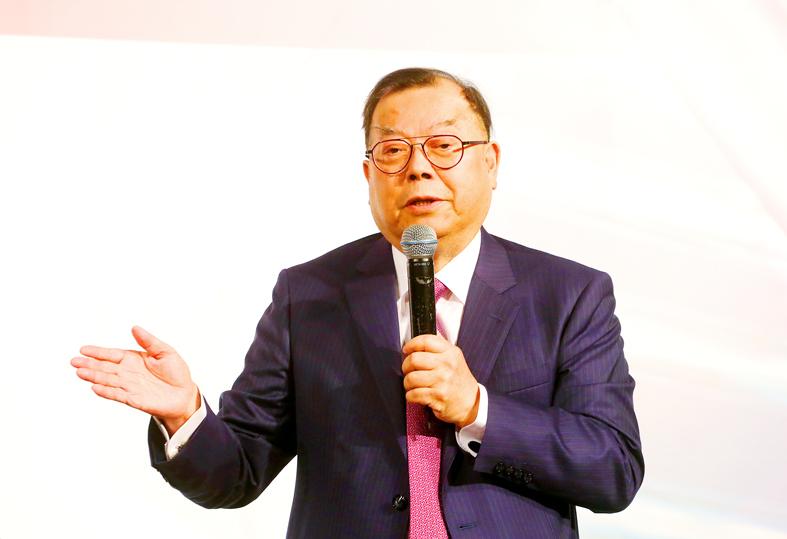Powerchip Semiconductor Manufacturing Corp (力積電) swung back into the black last year, reporting a net profit of NT$3.81 billion (US$134.51 million) attributable to healthy demand mainly for power management ICs and driver ICs for flat panels, the company said in a filing with the Taiwan Stock Exchange on Tuesday.
That translates into earnings per share of NT$1.23.
In 2019, Powerchip reported a loss of NT$1.48 billion, or losses per share of NT$0.94. Gross margin improved significantly to 24.06 percent last year, from 8.36 percent a year earlier.

Photo: CNA
Robust customer demand helped boost chip prices and revenue, which rose 37.24 percent to NT$45.68 billion last year from NT$35.9 billion a year earlier.
Power Semiconductor chairman Frank Huang (黃崇仁) told investors in December last year that he was optimistic about the company’s business outlook for this year, as strong demand for notebook computers, tablets and 5G smartphones has resulted in a severe shortage of almost all kinds of chips.
Supply of power management ICs, image sensors and display driver ICs has become so tight that the company has no extra capacity to meet demand, Huang said at the time.
He said that he expected supply constraints to spread to the memory chip segment in the second half of this year.
Powerchip’s board of directors on Tuesday approved a fundraising project offering 300 million new shares to existing shareholders.
The chipmaker could raise NT$12 billion, as each share is provisionally priced at NT$40, and the proceeds would be used mostly to expand capacity, and on research and development, the company said in a separate filing.
The Hsinchu-based chipmaker plans to start building two 12-inch fabs in Miaoli County’s Tongluo Industrial Park (銅鑼科學園區) later this month, which are to have a combined installed capacity of 100,000 wafers per month.
Powerchip’s board also approved a proposed cash dividend distribution of NT$0.49 per common share based on the second half of last year’s net profit. The distribution is subject to shareholders’ approval at the firm’s annual general meeting on June 9.
The proposal to launch an initial public offering is on the top of the agenda for the shareholders’ meeting.
The chipmaker reported that revenue grew 26.65 percent to NT$4.24 billion last month, from NT$3.35 billion a year earlier, and increased 1.28 percent from NT$4.19 billion a month earlier.
In the first two months of this year, Powerchip’s revenue expanded 22.53 percent to NT$8.43 billion, from NT$6.88 billion in the same period last year.

Intel Corp chief executive officer Lip-Bu Tan (陳立武) is expected to meet with Taiwanese suppliers next month in conjunction with the opening of the Computex Taipei trade show, supply chain sources said on Monday. The visit, the first for Tan to Taiwan since assuming his new post last month, would be aimed at enhancing Intel’s ties with suppliers in Taiwan as he attempts to help turn around the struggling US chipmaker, the sources said. Tan is to hold a banquet to celebrate Intel’s 40-year presence in Taiwan before Computex opens on May 20 and invite dozens of Taiwanese suppliers to exchange views

Application-specific integrated circuit designer Faraday Technology Corp (智原) yesterday said that although revenue this quarter would decline 30 percent from last quarter, it retained its full-year forecast of revenue growth of 100 percent. The company attributed the quarterly drop to a slowdown in customers’ production of chips using Faraday’s advanced packaging technology. The company is still confident about its revenue growth this year, given its strong “design-win” — or the projects it won to help customers design their chips, Faraday president Steve Wang (王國雍) told an online earnings conference. “The design-win this year is better than we expected. We believe we will win

Quanta Computer Inc (廣達) chairman Barry Lam (林百里) is expected to share his views about the artificial intelligence (AI) industry’s prospects during his speech at the company’s 37th anniversary ceremony, as AI servers have become a new growth engine for the equipment manufacturing service provider. Lam’s speech is much anticipated, as Quanta has risen as one of the world’s major AI server suppliers. The company reported a 30 percent year-on-year growth in consolidated revenue to NT$1.41 trillion (US$43.35 billion) last year, thanks to fast-growing demand for servers, especially those with AI capabilities. The company told investors in November last year that

Power supply and electronic components maker Delta Electronics Inc (台達電) yesterday said it plans to ship its new 1 megawatt charging systems for electric trucks and buses in the first half of next year at the earliest. The new charging piles, which deliver up to 1 megawatt of charging power, are designed for heavy-duty electric vehicles, and support a maximum current of 1,500 amperes and output of 1,250 volts, Delta said in a news release. “If everything goes smoothly, we could begin shipping those new charging systems as early as in the first half of next year,” a company official said. The new